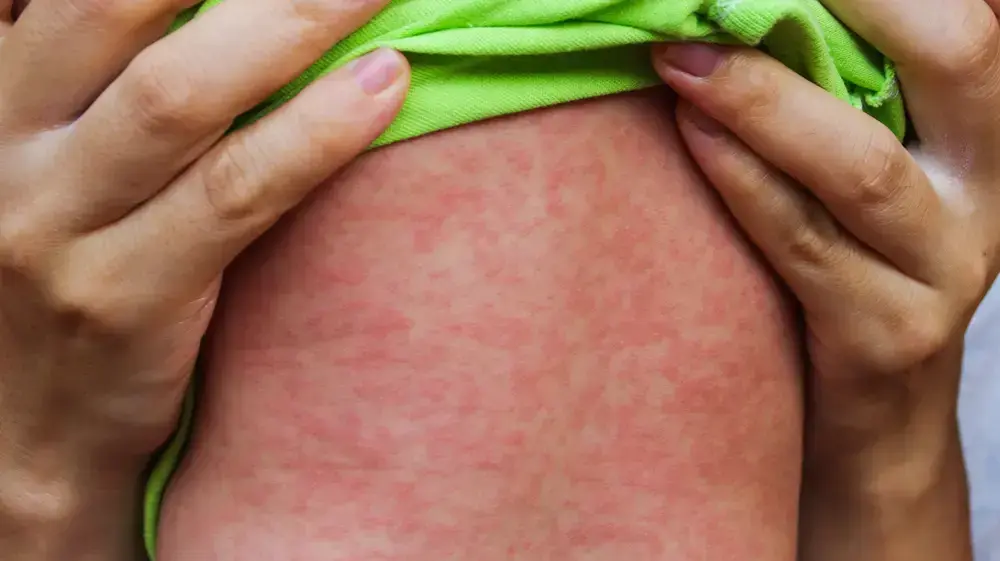WHO logo/Reuters, REUTERS/Denis Balibouse
The World Health Organization warns that more than half of the world's countries are at high risk of a measles outbreak by the end of this year, and emphasizes the need for urgent preventive measures.
Measles is a highly contagious viral infection, which can have serious consequences, especially in young children, pregnant women and people with a damaged immune system.
WHO estimates indicate that vaccines have prevented more than 56 million measles-related deaths since 2000.
The disappearance of measles requires high population immunity so that its transmission can be stopped.
Measles was once eradicated in the US in 2000 through an effective vaccination program. However, more than 61 million doses of MCV were delayed or missed during the coronavirus pandemic, according to a Centers for Disease Control and Prevention (CDC) report.
A baby's back is covered in a measles rash/ShutterStock
Last year over 306,000 cases of measles were reported worldwide, indicating a 79% increase from the previous year's numbers.
Last month, the Ministry of Health reported two cases of measles in the north of the country - a child who was not vaccinated against the virus and an adult who became ill.
In both cases, no source of infection was identified and none of them had been abroad recently. The month before, the Ministry of Health informed about a measles patient who was on a flight from Dubai to Israel.
"What we are worried about is that this year, 2024, we have these big gaps in our vaccination programs and if We'll fill them really quickly with the vaccine, the measles will just jump into that gap.
We can see, from data produced with WHO data by the CDC (US Centers for Disease Control and Prevention), that more than half of all countries in the world are going to be at high or very high risk of outbreaks by the end of this year," said Natasha Crowcroft, Senior Technical Advisor WHO's Measles and Rubella.
"We've had many measles outbreaks around the world and middle-income countries have really suffered.
And we're worried that 2024 is going to look like 2019," she warned. Crowcroft also called for urgent action to protect children, citing a "lack of commitment" from governments amid the current economic crises and conflict.
More in Walla!
How do you turn a plastic package into a flower pot?
In cooperation with the Tamir Recycling Corporation
What is measles?
"Measles is one of the most contagious infectious diseases. It is caused by the measles virus (Measles virus) belonging to the Paramyxovirus family. There are serious and life-threatening complications associated with this disease such as: pneumonia, meningitis and ear infections. The symptoms of the disease include: fever, Cough, runny nose, red eyes and a typical rash. The signs of the disease will usually appear between seven and 21 days after exposure to the virus," explains Prof. Yosef Peres, president of the "For You" organization led by the president's son-in-law Rabbi Yossi Arablich, and former director of Schneider Hospital.
"On the fourth or fifth day after the symptoms of the disease appear, a dark red rash appears on the skin. Usually, the rash starts on the neck and gradually spreads to the face, body and limbs. At first, the skin lesions are localized and multiple and tend to coalesce into a rash that covers large areas of the body. The rash begins to turn pale on the third day after its appearance And this is usually accompanied by an improvement in the patient's feeling. The rash is similar to the small, dense flowers of the heather, hence the name of the disease."
How do you get infected?
"It is very easy to catch measles. It is transmitted from person to person by spreading the virus into the environment during coughing, sneezing or contact with nasal secretions and phlegm. It is also possible to be infected while staying in the patient's room, up to two hours after the patient has left the room."
How do you prevent measles?
"Vaccines for "childhood diseases" in general and measles in particular, are essential in preventing the spread of measles and other infectious diseases. The measles vaccine is usually given as part of the MMR (measles, mumps and rubella) vaccine. The vaccine is safe, effective and has been shown to greatly reduce the incidence of the disease. The vaccine protects in 97 percent of the disease."
The measles vaccine consists of a live attenuated virus that is given by injection under the skin.
More on the same topic:
measles
World Health Organization

